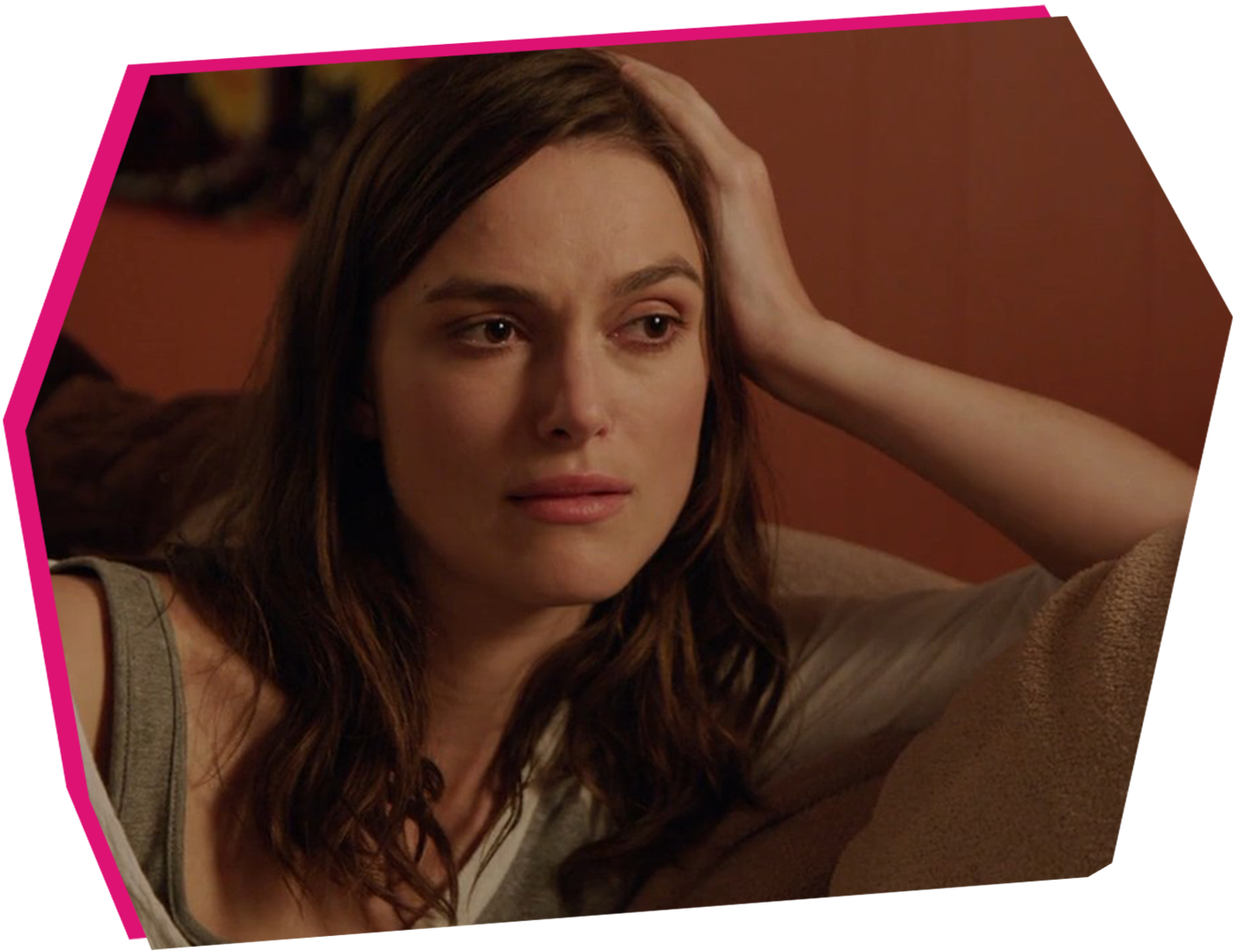Online screening
Thursday, June 23 at 7pm EDT
Available for 48 hours in Canada
Pre-order your ticket now!
In Aren’t You Happy?, The Melancholic Girl declares her depression is political. Something we usually consider very personal (mental illness) is seen as something outside of oneself. The apathetic character explains her depression, disillusionment, and dissatisfaction but never appears to feel it. This is in contrast to other characters, and real women, who meet that disillusionment in life at that age and feel all sorts about it. Where Susanne Heinrich has created a highly stylized Brechtian world to express these feelings and concerns, other films let their melancholic lead character be messy. These messy women watch their ideas of adulthood crumble away to reveal a tougher, uglier world and react with regression, depression, and aggression. In Laggies, she finds herself caught between teenage friendships and adult romantic relationships. In Sugar Daddy and White Rabbit, trying to keep artistic integrity leads to irrational behavior. Frances Ha struggles with independence from her best friend.
The Melancholic Girl passes from scene to scene explaining to characters why she can’t, or won’t, find happiness. To a one-night stand, she explains her romantic cynicism. To a celibate man, she explains her promiscuity. With a drag queen, she waits for the end of capitalism. To a yogi, she claims an inner void. Where other films about disillusioned modern women end with some happiness, or at least hope of happiness, the segmented nonlinear Aren’t You Happy? can merely offer the happiness of enjoying an ice cream cone.
Directed and written by Susanne Heinrich, 2019, Germany
A girl roams through the city looking for a place to sleep. Along the way she meets young mothers who celebrate motherhood religiously, goes home with an abstinent existentialist for whom sex is “just another market,” and waits for the end of capitalism in a drag bar. Her attempt to write a book doesn’t make it beyond the first sentence of the second chapter, and she finds no space between art galleries, yoga studios and the beds of strangers. Instead of trying to fit in, she starts regarding her depression as a political issue. Through 15 of the girl’s humorous encounters, Aren’t You Happy? explores our post-modern society between precarity and self-marketing, serial monogamy and neo-spirituality, disillusionment and the pressure to be happy.
German with English subtitles
The Longest Day of the Year
Lauren Hoover, 2021, USA
A comedic look at three roommates as they navigate the trials, tribulations, and innate loneliness inherent to quarantine.
This short film precedes the feature film.
Tish is pleased to welcome Maia (aka Broey Deschanel) to “The Female Gaze” to talk about Aren’t You Happy? and the disillusioned modern woman in film.
In her video essays, Maia specializes in media analysis, cultural studies, critical race theory, and politics. Her work confronts viewers’ notions of what films are about, questions the film industry and pop culture, and reveals facets of media viewers previously hadn’t considered.
Centered around Aren’t You Happy?, Tish and Maia will have a conversation about happiness in capitalism, messy women, political feminism, and, of course, what even is the female gaze.
Program:
The Longest Day of the Year
Aren’t You Happy?
The Disillusioned Modern Woman with Maia
Thurs. June 23, 7pm EDT, available on-demand until Sat. Jan. 25, 7pm EDT across Canada.
Tickets:
$12 (plus HST, CFI Member discounts apply)
Pre-order to get a reminder!
Mouthpiece
Directed and written by Patricia Rozema, 2018, Canada
Cassandra, who is portrayed by the two women, expresses the opposing voices that exist inside the modern woman's head, during a 48-hour period as she tries to organize the affairs for her mother's funeral.
Able to contemplate the patriarchy while hooking up with a man, enjoy and be disgusted by catcalling, and remember her mother fondly and fairly, Cassie portrays many dualities of being a woman in the modern world.
Watch in Canada on Mubi, CBC Gem, and others.
Frances Ha
Directed by Noah Baumbach and written by Noah Baumbach and Greta Gerwig, 2012, USA
A New York woman (who doesn't really have an apartment) apprentices for a dance company (though she's not really a dancer) and throws herself headlong into her dreams, even as the possibility of realizing them dwindles.
The difference between moving forward and spiralling down is attitude; where others might give up, Frances holds onto a, perhaps naive, optimism that moves her forward in adulthood.
Watch in Canada on Prime Video, The Criterion Channel, and others.
Laggies
Directed by Lynn Shelton and written by Andrea Seigel, 2014, USA
In the throes of a quarter-life crisis, Megan panics when her boyfriend proposes. She takes an opportunity to escape for a week, hiding out in the house of her new 16-year-old friend Annika and her world-weary single dad.
In a clear metaphor for this phase of life; Megan can be both a teenage girl’s friend and an adult man’s lover, but both can’t last.
Watch in Canada on Prime Video, Hoopla, and others.
White Rabbit
Directed by Daryl Wein and written by Vivian Bang and Daryl Wein, 2018, USA
A dramatic comedy following a Korean-American performance artist who struggles to be authentically heard and seen through her multiple identities in modern Los Angeles.
Sophia gives her all to her art, and her life, without seeing the ramifications of either on the people around her.
Watch in Canada on Apple.
Sugar Daddy
Directed by Wendy Morgan and written by Kelly McCormack, 2020, Canada
Darren, a young talented musician, dreams of making music like nobody has before. But she's broke. Desperate for cash, she signs up to a paid-dating website, throwing herself down a dark path that shapes her music with it.
Many artists can relate to allowing oneself to be distracted from making art; fear of failure is often really fear of success.
Watch in Canada on Cineplex, Apple, and others.
Daisies (Sedmikrásky)
Directed by Vera Chytilová and written by Vera Chytilová and Ester Krumbachová, 1966, Czechoslovakia
After realizing that all world is spoiled, Marie and Marie are committed to be spoiled themselves. They rip off older men, feast in lavish meals and do all kinds of mischief. But what is all this leading to?
Like a chaotic, surreal grandmother to Aren’t You Happy? these protagonists take a more cheerful approach to their declarations of their patriarchal society.
Watch in Canada on The Criterion Channel.















